Hurled eggs and firecrackers at police: Why farmers’ protests have gripped Europe
Hurled eggs and firecrackers at police: Why farmers’ protests have gripped Europe
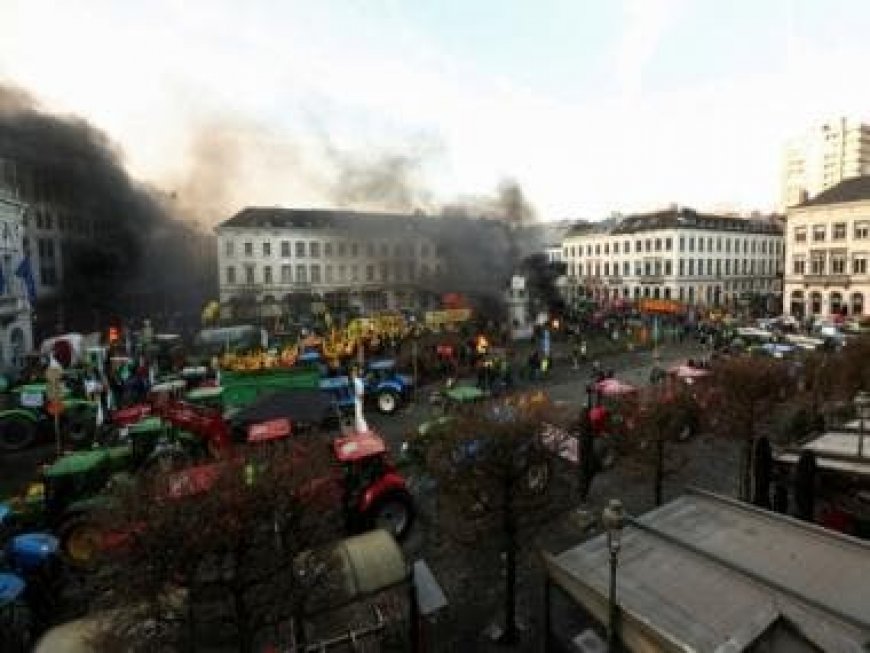
Europe’s farming sector is in crisis.
Protesting farmers converged on the heart of the European Union on 1 February, coinciding with a crucial summit of leaders from across the EU, in which more funding for war-torn Ukraine was approved.
Early in the morning, protesters drove their tractors into Brussels and gathered in front of the European Parliament, the site of the summit. They set off fires, hurled eggs, and blared horns.
Farmers’ complaints across Europe include being choked by green rules, taxes, rising costs, and unfair competition from abroad.
Here’s all we know about the protest.
Farmers’ protest overshadows EU summit
Angry farmers took to the streets around the European Parliament in central Brussels, holding banners, yelling slogans, throwing eggs, and burning trash to express their deep dissatisfaction with the EU’s indifference to the declining economy, reduced incomes, and rising prices, with riot police spraying water cannons to disperse demonstrators, according to Reuters.
A handful of tractors had been parked near the EU Parliament all week before convoys from across the country converged on Thursday morning.
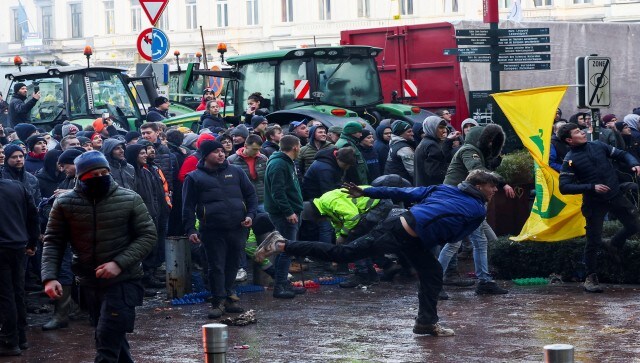
The protesters included farmers from Belgium, Italy, Spain, Germany, Romania, and Greece, with nearly 1,000 tractors driven into the neighbourhood of the EU institutions.
The demonstrators chanted slogans, hoping that the leaders attending the EU special summit would listen to their voices. However, agricultural issues were not included in the official agenda of the special summit that day.
One tractor displayed a banner saying “If you love the earth, support those who manage it” as farmers from Belgium and other European countries try to make themselves heard by EU leaders meeting later.
Another banner read: “No farmers, no food.”
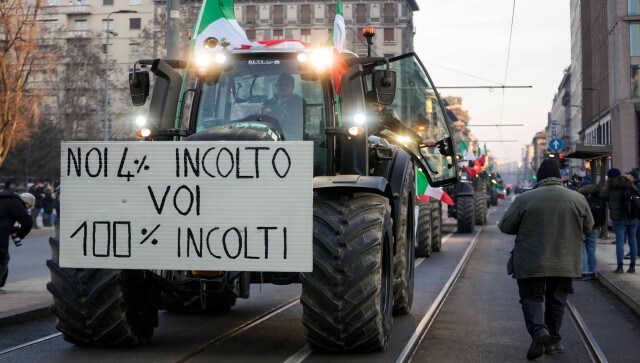
“If you see how many people we are here today, and if you see it’s all over Europe, you must have hope,” Kevin Bertens, a Belgian farmer, told Reuters. “You need us. Help us.”
Pierre Sansdrap, a Belgian dairy farmer, told AFP that it was “symbolically important” to protest in Brussels. “To change things, you have to come here,” he said.
Farmers union representatives said they were “fed up in general” with “too much administration” and rules telling them how they should farm.
Olivier Devalckeneer, from the Fédération Wallonne d’Agriculture, said: “We want a change; we want farming to be protected, not undermined.”
Similar protests in different EU countries
According to The Associated Press, the biggest demonstrations have been seen in France, where farmers blocked highways around Paris with their tractors.
There were traffic barricades on highways around Paris amid a large police presence as French prime minister Gabriel Attal announced measures to quell the unrest.
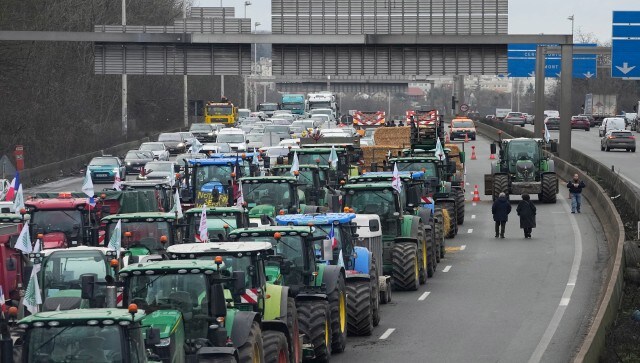
Lines of tractors rolled menacingly across a residential street in Poland and across a German bridge while farming protesters in Italy burned spectacular nighttime fires by stone statues.
Their protests have snarled traffic in cities, preventing millions of European citizens from getting to work or school, while blockades of ports and major traffic arteries meant flowers wilted in trucks and supermarket shelves were left bare.
Hungarian PM Viktor Orbán even complained the endless honking of tractors kept him up at night.
Why farming sector is in crisis
Farmers have been lamenting for weeks that it’s become tougher than ever to make a decent living as prices for energy and fertiliser soar due to Russia’s war in Ukraine, more and cheaper agriculture imports enter the EU, and crops are destroyed by droughts, floods, or fires brought on by climate change. Protesters claimed that the EU had not given farmers in its member states adequate support at this challenging time.
For those unversed, the EU removed taxes on Ukrainian import and quotas in light of Russia’s invasion of Ukraine, as per CNN.
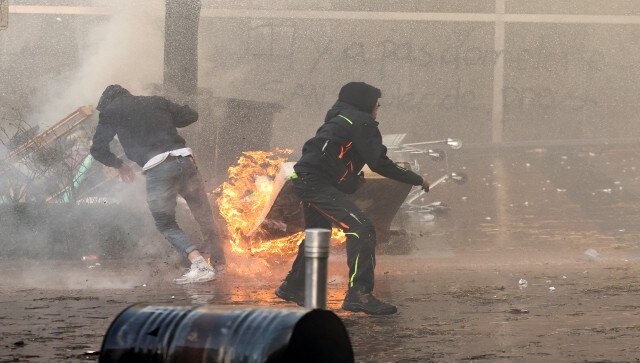
“The price is very high, the gasoline is very high, the fertilization is very high, so it is difficult for us to cope with these prices without any kind of help from the Union community,” said Italian protester Cristina, according to Reuters.
Belgian farmer Pierre said that the farmers had been greatly disappointed that the agricultural issues were not discussed at the summit, as many local farmers had reached the end of their rope.
“We are currently in a state of loss. We had help from the EU to make up for the losses, but the problem now is that the subsidies are constantly decreasing, so that we cannot withdraw funds for reproduction,” Pierre said.
One of the main issues farmers in Europe are facing is a free-trade agreement with Latin American nations that has been in the works for over two decades. It is now seeing increased pressure from European farmers and politicians. Farmers are concerned that the European agriculture sector would see even more unfair competition as a result of the Mercosur agreement, as per The Guardian.
“We want the EU to be aware of our situation. There are too many regulations, the salaries are not high enough, and now we are facing imports because of the Mercosur deal where farmers don’t even have to have the same standards as us,” said Emile Herbiet, a Belgian blue cattle-breeder, according to the report.
Administration’s response
After the farmers protest overshadowed the EU summit, French president Emmanuel Macron said that Europe’s farming sector is facing a big crisis and must “profoundly” change its rules. He said there should be a joint EU mechanism to guarantee fair prices paid to farmers by food giants and supermarkets, and regulations should be simplified, according to The Guardian.
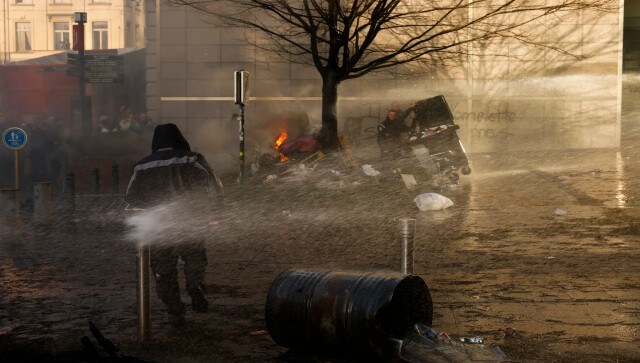
Ahead of the EU parliamentary elections in June, most leaders at the summit were keen to win over farmers, especially as populist and hard-right politicians have latched on to their plight in recent weeks. “Don’t demonize the farmers. Don’t send the army on them. But talk to them,” Belgian Prime Minister Alexander De Croo said, as per AP. “To the farmers that are outside. We see you and we hear you,” said Roberta Metsola, the European Parliament president.
Leaders welcomed the plan of the European Commission, the EU’s executive branch, to shield farmers from cheap imports from Ukraine during wartime and allow farmers to use some land that had been forced to lie fallow for environmental reasons.
EU Commission chief Ursula von der Leyen also promised Thursday to prepare by the end of the month new plans to cut reams of bureaucratic rules to make sure farmers can spend more time in their fields, not in their offices. The suggested speed seemed light years faster than some other EU initiatives take.
In France, PM Attal announced a new set of measures, including hundreds of millions of euros in aid and tax breaks, and also promised not to ban pesticides in France that are allowed elsewhere in Europe.
In Brussels, many leaders also said they would not approve a trade deal with South American nations that is under consideration unless any imports would meet the same regulatory standards that EU farmers face, a key demand from the sector.
“The priority for us should be implementing existing rules and regulations and not imposing new additional ones on farmers over the next couple of years,” said Irish PM Leo Varadkar, adding to a chorus of soothing words from leaders on the subject.
With inputs from agencies
What's Your Reaction?



























































